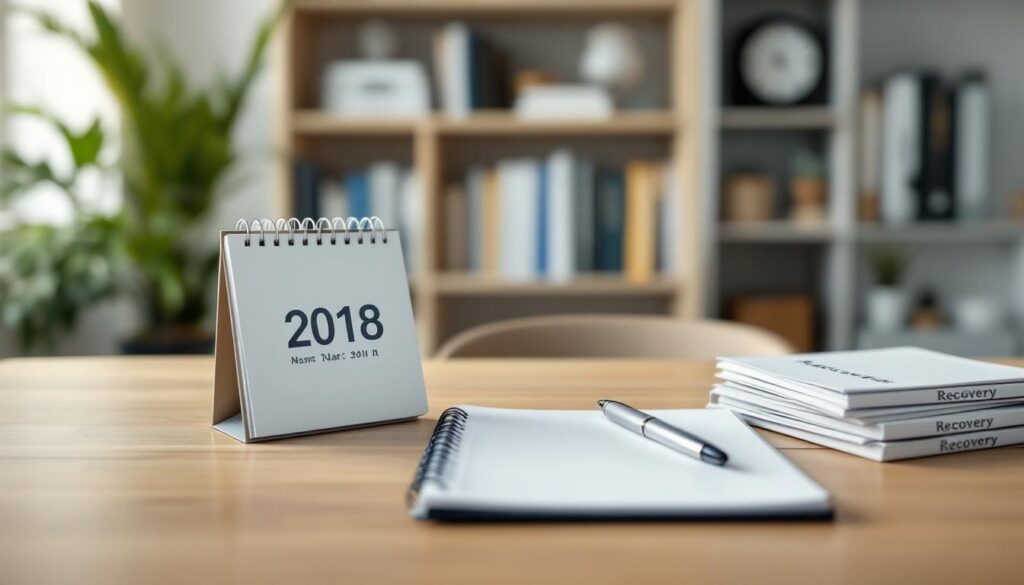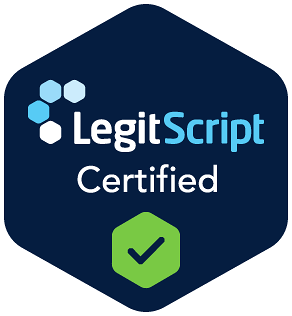Finding the right books on recovery from drug addiction can transform your healing journey. The right book provides guidance, hope, and practical strategies when you need them most.
We at Amity Palm Beach understand that choosing from thousands of recovery books feels overwhelming. This guide will help you locate the most effective resources for your specific needs and recovery stage.
What Types of Recovery Books Should You Read?
Memoirs and Personal Stories of Recovery
Recovery literature falls into three distinct categories, each serving different needs in your healing journey. Memoirs and personal stories offer raw, authentic accounts from people who survived addiction and rebuilt their lives. Books like Erin Khar’s “Strung Out” and Matthew Perry’s “Friends, Lovers, and the Big Terrible Thing” provide unfiltered perspectives on recovery challenges.
These narratives help you feel less alone and show that recovery is possible, even after multiple relapses. Authors share their darkest moments alongside breakthrough victories, creating powerful connections with readers who face similar struggles. However, avoid memoirs if you’re easily triggered, as some authors romanticize their drug use experiences (particularly in earlier addiction literature from the 1990s and 2000s).
Self-Help and Practical Guide Books
Self-help and practical guides focus on actionable strategies you can implement immediately. “The Recovery Book” by Al J. Mooney offers step-by-step guidance through recovery phases, while “The Addiction Recovery Skills Workbook” by Suzette Glasner-Edwards integrates cognitive behavioral therapy techniques with mindfulness practices.
These books excel at providing concrete tools for managing cravings, building healthy routines, and preventing relapse. They include worksheets, daily exercises, and structured programs that transform abstract recovery concepts into measurable actions. Many readers find these books most helpful during early recovery when they need specific direction rather than inspiration alone.
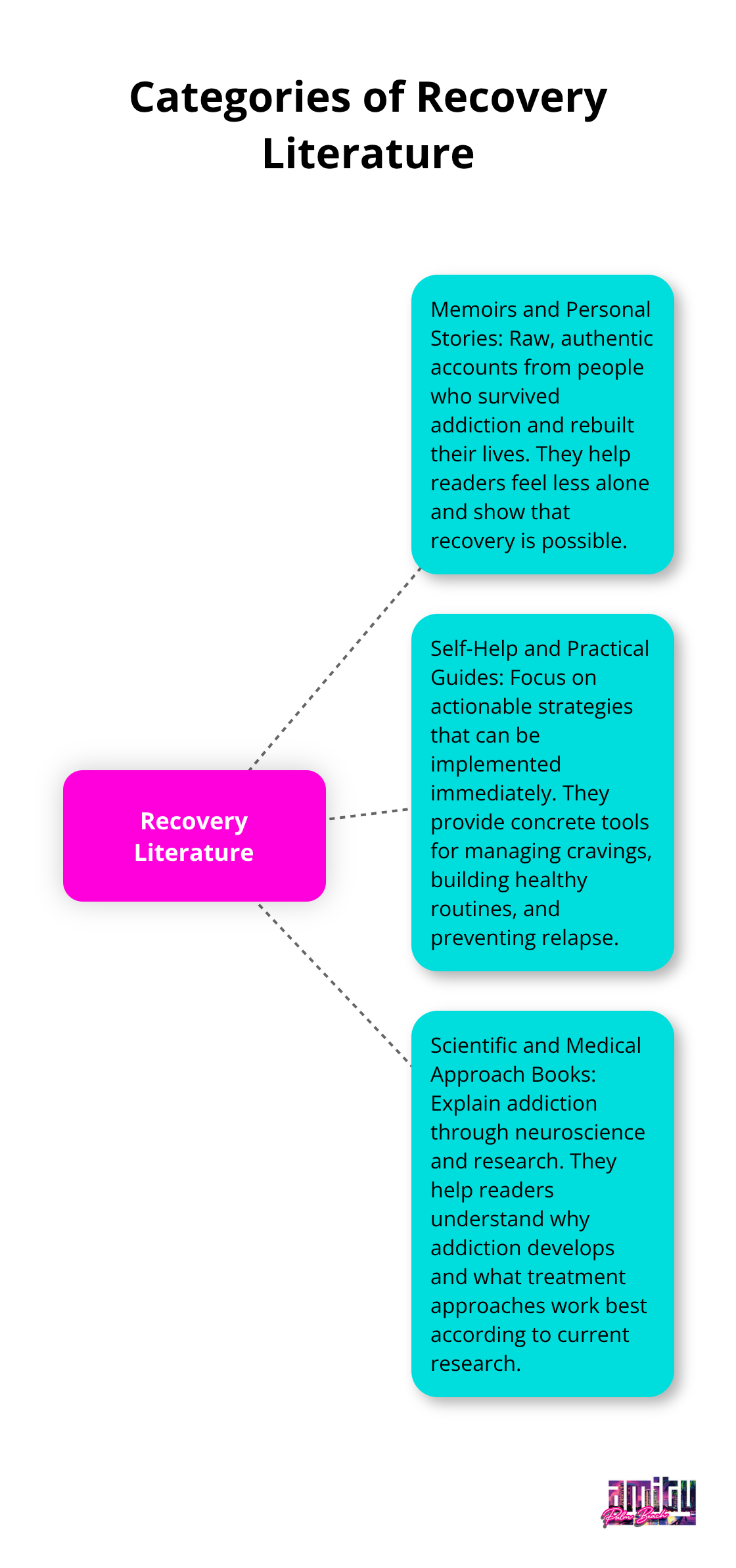
Scientific and Medical Approach Books
Scientific and medical approach books explain addiction through neuroscience and research. Judith Grisel’s “Never Enough” combines personal experience with brain science, while Maia Szalavitz’s “Unbroken Brain” presents addiction as a learning disorder rather than moral failing.
These evidence-based resources help you understand why addiction develops and what treatment approaches work best according to current research. They debunk common myths about addiction and provide scientific backing for various recovery methods, including addiction treatment approaches. This knowledge becomes particularly valuable when you need to advocate for yourself in treatment settings or explain your condition to skeptical family members.
Now that you understand the main types of recovery books available, you need to know where to find these valuable resources and how to access them affordably.
Where Can You Find Recovery Books
Online Bookstores Provide Instant Access
Amazon stocks over 15,000 titles in their addiction and recovery category and delivers both physical and Kindle versions with same-day service in major cities. Barnes & Noble maintains approximately 2,500 recovery titles in their health section, while Apple Books and Google Play Books grant instant digital access to most recovery literature. Audible hosts over 1,200 recovery audiobooks, which serve people in early recovery who face concentration challenges exceptionally well. Book Depository ships recovery books worldwide at no cost, which makes international titles accessible regardless of your location.
Library Systems Provide Free Access
Public libraries maintain extensive recovery collections, with library staff reporting significant exposure to substance use issues in their communities. Most library systems participate in interlibrary loan programs and fulfill requests for specific recovery books within 5-7 business days. OverDrive and Hoopla digital platforms connect to your library card and provide free access to recovery audiobooks and ebooks without wait times. Many libraries host weekly recovery book clubs that create accountability while you read.
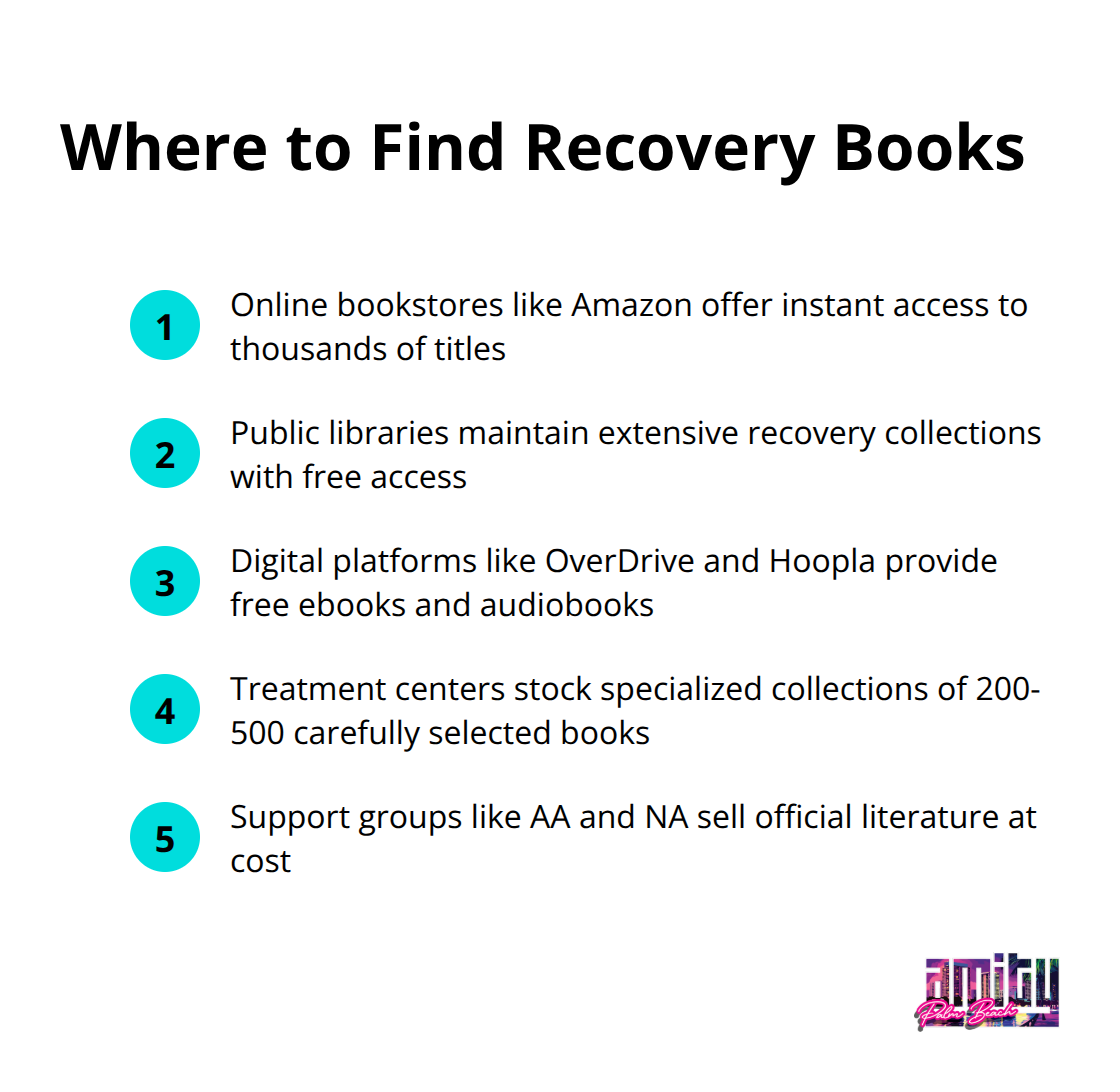
Academic libraries at universities stock the most current research-based recovery books, and most allow community members to access materials for a small annual fee.
Treatment Centers Maintain Specialized Collections
Residential treatment facilities typically stock libraries with 200-500 carefully selected recovery books that focus on evidence-based titles aligned with their treatment philosophies. Outpatient centers often lend books to clients during treatment, with some centers requiring small deposits that return when you finish reading. Support groups like Alcoholics Anonymous and Narcotics Anonymous sell official literature at cost, with most books priced between $8-15. Many treatment centers partner with local bookstores to offer discounted recovery books to clients (discounts range from 15-25% off retail prices).
The abundance of recovery book sources means you can access these resources regardless of your budget or location. However, with thousands of titles available, you need a strategy to select books that match your specific recovery needs and learning preferences, including relapse prevention strategies and family recovery approaches.
Which Recovery Book Matches Your Recovery Stage
Early Recovery Requires Structured Guidance
Early recovery (first 90 days) demands books with clear daily actions and immediate coping strategies. “The Addiction Recovery Skills Workbook” by Suzette Glasner-Edwards provides structured exercises that address acute withdrawal symptoms and early triggers. Complex memoirs overwhelm your fragile recovery foundation during this phase, so avoid them completely. Research from the National Institute on Drug Abuse shows that 40-60% of people relapse within the first year, which makes structured guidance books your strongest defense against early setbacks.
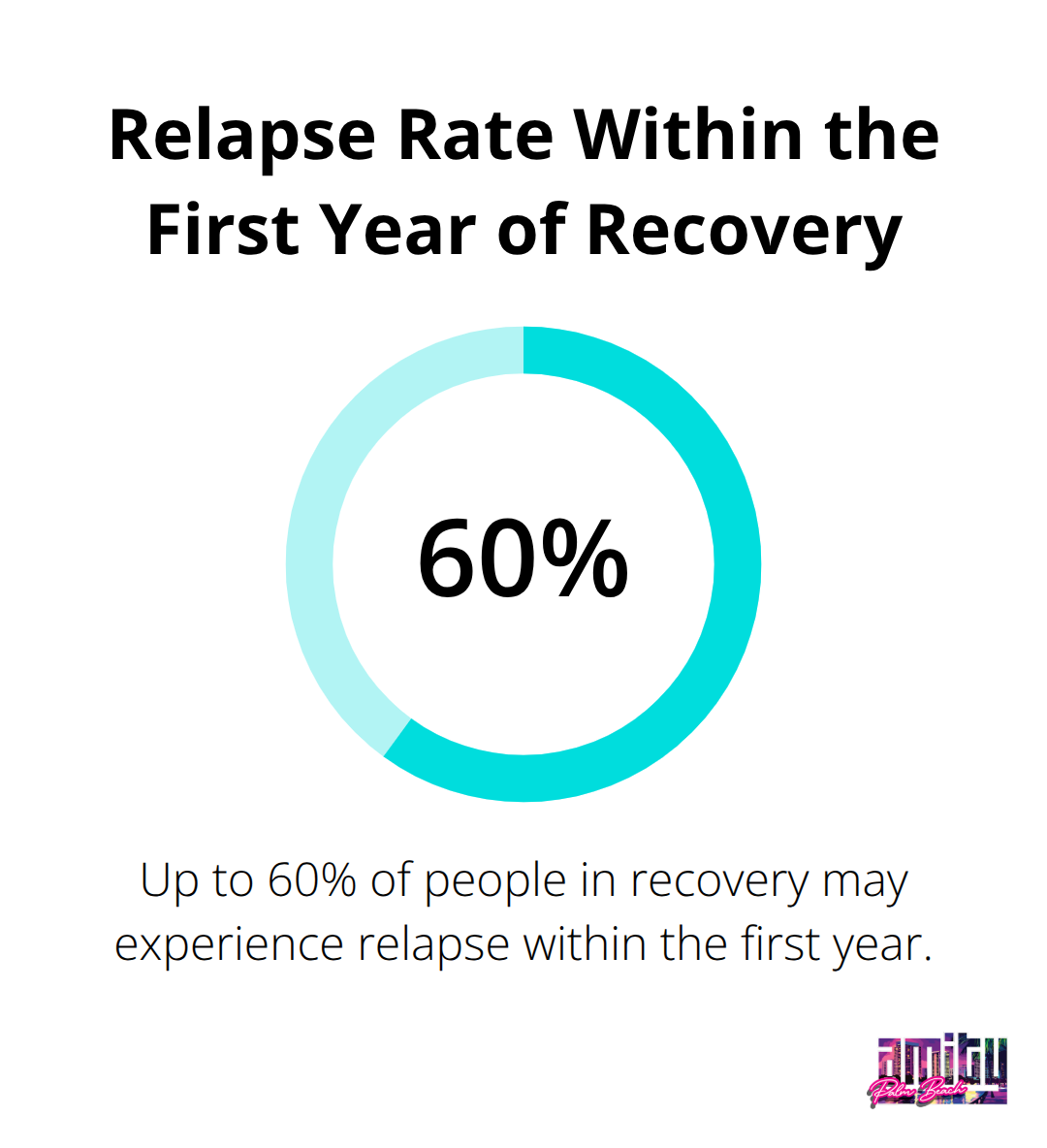
Established Recovery Benefits From Deeper Exploration
After six months of sobriety, you can handle more complex recovery literature that addresses underlying trauma and emotional patterns. Books like “In the Realm of Hungry Ghosts” by Gabor Maté combine neuroscience with compassionate self-understanding, helping you address root causes rather than just symptoms. Visual learners should choose books with diagrams and charts, while auditory learners benefit from recovery audiobooks during commutes or exercise sessions.
Match Books to Your Personal Learning Style
Kinesthetic learners need workbooks with hands-on exercises and journaling prompts that engage their need for physical interaction with material. Analytical readers prefer evidence-based books that present research data and scientific explanations for addiction mechanisms. Emotional processors connect better with personal memoirs and story-based recovery accounts that validate their experiences through shared struggles.
Professional Guidance Prevents Costly Mistakes
Licensed addiction counselors recommend specific books based on your addiction type, trauma history, and learning preferences. Treatment centers maintain curated libraries aligned with evidence-based practices that complement therapeutic approaches rather than conflict with them. Your therapist can identify books that support your treatment plan and avoid titles that might trigger relapse episodes. Peer support specialists who maintain long-term sobriety often suggest books that helped them navigate similar challenges you currently face, saving you from wasting time on ineffective resources. For comprehensive addiction treatment resources, professional guidance remains essential.
Final Thoughts
You can find books on recovery from drug addiction through multiple channels that serve different needs and budgets. Online bookstores like Amazon offer instant access to over 15,000 recovery titles, while public libraries provide free resources through digital platforms like OverDrive. Treatment centers maintain curated collections of evidence-based books that complement therapeutic approaches.
Recovery literature provides practical coping strategies, reduces isolation, and offers hope during challenging moments. Research shows that people who engage with recovery books develop stronger emotional resilience and achieve better long-term sobriety outcomes. You should select one book from each category: a practical guide for immediate tools, a memoir for inspiration, and a scientific approach book that explains addiction mechanisms (consult with addiction professionals to identify titles that support your specific treatment plan).
We at Amity Palm Beach understand that recovery requires comprehensive support beyond books alone. Our treatment programs combine medical interventions with personalized care to address addiction and co-occurring mental health conditions. Take the first step toward lasting recovery by contacting our compassionate team today.


